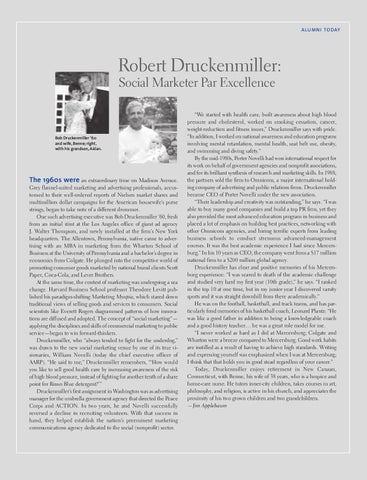A L U M N I TO DAY
Robert Druckenmiller: Social Marketer Par Excellence
Bob Druckenmiller ’60 and wife, Benne; right, with his grandson, Aidan.
The 1960s were an extraordinary time on Madison Avenue. Grey flannel-suited marketing and advertising professionals, accustomed to their well-ordered reports of Nielsen market shares and multimillion dollar campaigns for the American housewife’s purse strings, began to take note of a different drummer. One such advertising executive was Bob Druckenmiller ’60, fresh from an initial stint at the Los Angeles office of giant ad agency J. Walter Thompson, and newly installed at the firm’s New York headquarters. The Allentown, Pennsylvania, native came to advertising with an MBA in marketing from the Wharton School of Business at the University of Pennsylvania and a bachelor’s degree in economics from Colgate. He plunged into the competitive world of promoting consumer goods marketed by national brand clients Scott Paper, Coca-Cola, and Lever Brothers. At the same time, the context of marketing was undergoing a sea change. Harvard Business School professor Theodore Levitt published his paradigm-shifting Marketing Myopia, which stared down traditional views of selling goods and services to consumers. Social scientists like Everett Rogers diagrammed patterns of how innovations are diffused and adopted. The concept of “social marketing”— applying the disciplines and skills of commercial marketing to public service—began to win forward-thinkers. Druckenmiller, who “always tended to fight for the underdog,” was drawn to the new social marketing venue by one of its true visionaries, William Novelli (today the chief executive officer of AARP). “He said to me,” Druckenmiller remembers, “‘How would you like to sell good health care by increasing awareness of the risk of high blood pressure, instead of fighting for another tenth of a share point for Rinso Blue detergent?’” Druckenmiller’s first assignment in Washington was as advertising manager for the umbrella government agency that directed the Peace Corps and ACTION. In two years, he and Novelli successfully reversed a decline in recruiting volunteers. With that success in hand, they helped establish the nation’s preeminent marketing communications agency dedicated to the social (nonprofit) sector.
“We started with health care, built awareness about high blood pressure and cholesterol, worked on smoking cessation, cancer, weight-reduction and fitness issues,” Druckenmiller says with pride. “In addition, I worked on national awareness and education programs involving mental retardation, mental health, seat belt use, obesity, and swimming and diving safety.” By the mid-1980s, Porter Novelli had won international respect for its work on behalf of government agencies and nonprofit associations, and for its brilliant synthesis of research and marketing skills. In 1988, the partners sold the firm to Omnicom, a major international holding company of advertising and public relations firms. Druckenmiller became CEO of Porter Novelli under the new association. “Their leadership and creativity was outstanding,” he says. “I was able to buy many good companies and build a top PR firm, yet they also provided the most advanced education program in business and placed a lot of emphasis on building best practices, networking with other Omnicom agencies, and hiring terrific experts from leading business schools to conduct strenuous advanced-management courses. It was the best academic experience I had since Mercersburg.” In his 10 years as CEO, the company went from a $17 million national firm to a $200 million global agency. Druckenmiller has clear and positive memories of his Mercersburg experience: “I was scared to death of the academic challenge and studied very hard my first year (10th grade),” he says. “I ranked in the top 10 at one time, but in my junior year I discovered varsity sports and it was straight downhill from there academically.” He was on the football, basketball, and track teams, and has particularly fond memories of his basketball coach, Leonard Plantz: “He was like a good father in addition to being a knowledgeable coach and a good history teacher… he was a great role model for me. “I never worked as hard as I did at Mercersburg; Colgate and Wharton were a breeze compared to Mercersburg. Good work habits are instilled as a result of having to achieve high standards. Writing and expressing yourself was emphasized when I was at Mercersburg; I think that that holds you in good stead regardless of your career.” Today, Druckenmiller enjoys retirement in New Canaan, Connecticut, with Benne, his wife of 38 years, who is a hospice and home-care nurse. He tutors inner-city children, takes courses in art, philosophy, and religion, is active in his church, and appreciates the proximity of his two grown children and two grandchildren. —Jim Applebaum
